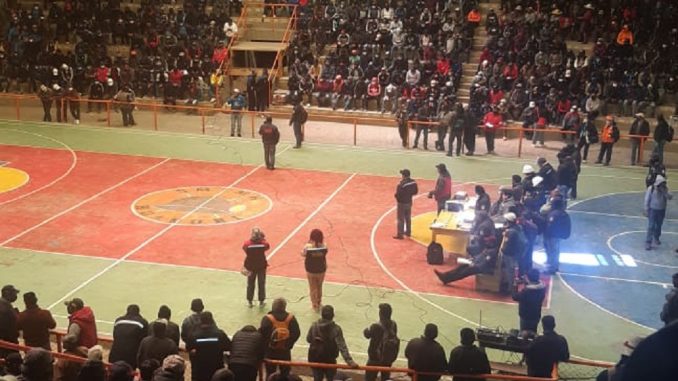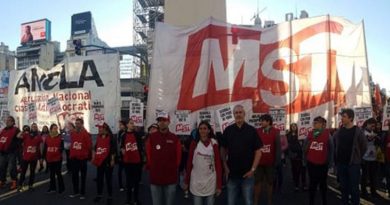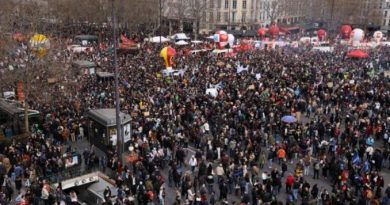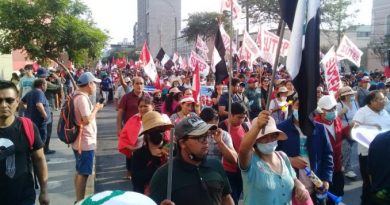Bolivia: It is urgent to cancel millionaire debts with the Huanuni miners
On Wednesday 9 In September, an important assembly of mine workers was held in Huanuni, city and municipality located in the department of Oruro, in Bolivia. The mine has some 3.200 workers, to those who are owed three months of salaries, since that same day, Wednesday, they were paid one of the 4 months that they had without pay.
This critical situation strongly affects the city, who practically lives off the activity of the mine and its income. With a population that is around 25 thousand inhabitants, almost 4.000 meters above sea level, settled on the slopes of the Posokoni hill, rich in tin.
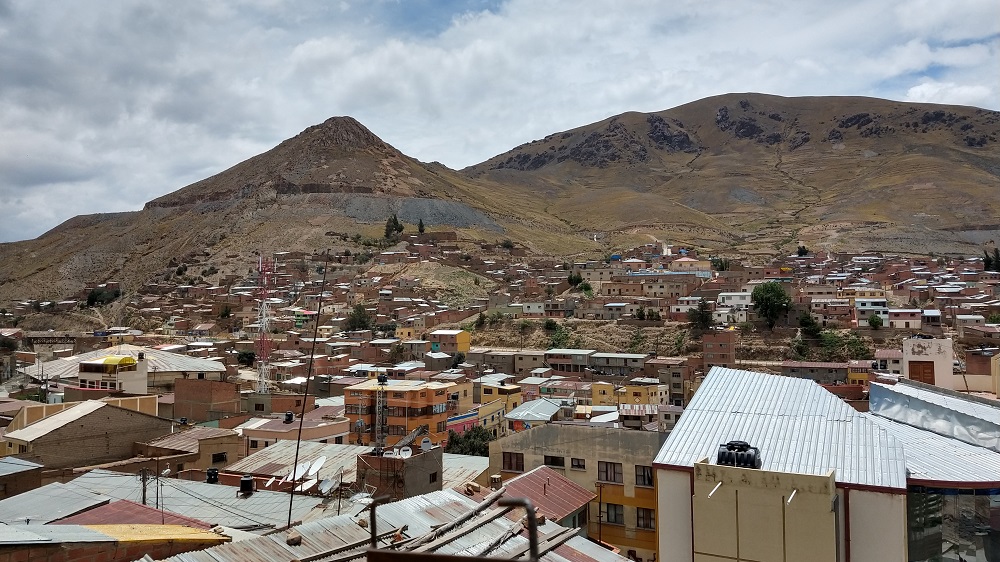
Of course, seriously affects and in the midst of a pandemic, to the working families of miners who do not have the minimum. Along with silicosis that affects the health of each worker, exposes them more strongly to the consequences of COVID-19, where public health care does not have strong development and investment from governments. Neither now nor with the years of government of Evo and the MAS.
The Huanuni mine is state-owned, like the Colquiri mine and they sell their tin production to another state mine, the Metalurgical Company of Vinto. One of the largest foundry companies in the world, into an income generating industry for the region and the nation.
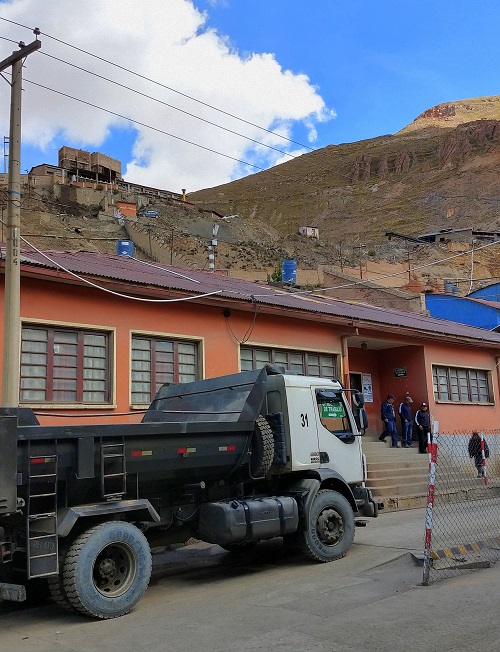
Long history of debt, in particular with the MAS
These companies are part of the Bolivian Mining Corporation (Comibol). In addition to guaranteeing thousands of jobs, They are a source of recruiting hard-working and professional labor who develop their experience in metallurgy.. In Vinto, nationalized company in 2007 and also located in Oruro, in addition to tin smelting, research activities are carried out to improve metal production, key to productive and social development.
Regrettably, along the lines of the Áñez government that reproduces the same political tricks that the MAS had to condition the workers and the people of Huanuni, The Vinto company has not been paying for the deliveries of the “concentrates” that the mine delivers. Which has led to a large debt. An extensive and exhausting report was given at the assembly, full of figures and data, narrated non-stop by the person in charge of the Business Superintendence.
LIS Companions, International Socialist League in Bolivia, participated in this assembly. Therefore we can inform that, between salaries owed for May, June and July workers are owed US$9,289,237, what it means 64.653.090 of Bolivians. In addition, it was reported that the AFP has not been paid since January, being an employer's obligation to pay it. The National Health Fund has not been canceled since January either..
At the same time, The Business Superintendence says it has received income from Vinto 2 millions of dollars, What are they 13,5 million Bolivians. While you have short-term accounts payable 54.815.820 of dollars and 381.518.110 of Bolivians.
In the assembly there was an intense debate and several critical interventions, both with the company and with the lack of management from the leadership of the Huanuni Mining Workers Union (SMTMH), from COD (Departmental Workers' Center) from Oruro and even from the COB, the Central Obrera Boliviana. Headed by Juan Carlos Huarachi, who left Huanuni, but he doesn't lift a finger for his workers.
It was also questioned that, by selling to the private company instead of Vinto, there is a difference of 309 dollars per ton. And if you add transportation costs and more, comes to 518 dollars per ton the difference. with what, in the 600 tons, they are losing much more than 300 one thousand dollars. For this reason, the need to renegotiate with Vinto and demand that the entire debt be paid was insisted..
Even more, This is a problem that is not new for Huanuni or for other miners like in Colquiri.. But it comes from years, particularly under the entire long government of Evo and the MAS, since these claims and conflicts go back and repeat in 2008, 2012, 2013, 2014, 2016 and so. This led, precisely, because the past 30 of June, Huanuni Mining workers will take over the Vinto facilities, together with workers from Colquiri. It was a protest to demand the payment owed for tin concentrates by the Vinto metallurgical company., which owed Huanuni some US$39 million and Colquiri another US$43 million.
A common request: Reassure the bases…
The Bolivian Mining Corporation said it was mediating the conflict and involved the Minister of Mining, but the situation was not resolved, becomes recurrent and critical. At that time and as is the tradition of state bureaucracies, business and union organizations in Bolivia, from the Ministry of Mining“He asked the union leaders, reassure their bases”, as recognized in the official report[1]. They did that, instead of giving the solutions as corresponds to those who are today in the national Ministry of Mining, to bring true tranquility to the bases and exploited working families.
Can the minister and COMIBOL officials live four months without being paid...? Outrageous. They play with workers' needs. And they appeal to “punishment” or financial drowning, just as the MAS used to do in its years of government, to condition whether Huanuni aligns or not with the current government. Having participated in the blockades, against the Áñez government and demanding answers, it's part of this.
In this context, The Central Bank of Bolivia issued a report that places mining as one of the sectors hardest hit by the pandemic, with a contraction of the activity of the 33,4% in the first months of the year between zinc, plata, lead and tin, which registered a drop in the production of 19,1% (Page 7, 21/8). The decline in construction is also marked, transportation and storage, the manufacturing industry, oil and natural gas trade, in a disastrous balance of the right-wing government of Jeanine Áñez and her corrupt ministers, anti-workers and privatizers.
The failure is so resounding that the Central Bank itself must recognize that“after almost 20 years, economic activity fell 5,6% in the accumulated as of April 2020”. From Huanuni it was reported some time ago that mineral production was decreasing, but not because of COVID infections, but due to the lack of inputs and materials.
The explanation given by the BCB is that the decrease would be attributed to lower prices and lower external demand., particularly from China. Tin being one of the minerals affected, next to zinc, what would have happened due to lower production in the Asian automotive and construction industries, according to the Central.
Actually, This sounds more like a justification than the real cause of the fall.. But even if it were, The Bolivian State should guarantee its workers' livelihood and not allow a debt of 4 months in salaries, in the midst of a pandemic that has claimed more than 25 workers died in Huanuni and there is also a significant number of deaths between Colquiri and Vinto. These are workers with underlying diseases such as lung disease and who, criminally, The Health Fund is not taking its forecasts nor is it treating them in a timely manner or they must wait more than a week for the tests..
Regrettably, the only determination of the massive assembly, after the exhausting reports, was that an audit be carried out on the former managers who passed through the company due to poor economic management. The proposals of a Grassroots Committee to overcome the stillness of the leadership of the Mining Union, motion that even had the support of the assembly in a sector of the mine, was not considered. As well as the need to move to direct actions, engage in political negotiation and ensure that the national State takes charge of the salary debt and payment to suppliers so that there is no lack of inputs to maintain production.
Fight for Áñez to leave and health to be guaranteed, education and work
This occurs in a Bolivia that has been going through strong workers' struggles., peasant, neighbors and indigenous people who win the streets, they carry out strikes, blockades and protests to demand health, education, job and for Áñez and her government to leave. Far from the vision of a fascist government that is based on repression, The continuity of the government is sustained because the people's struggle to overthrow it, It has been delivered by the leadership of the COB and the so-called Unity Pact, as well as the agreement behind the people's backs in Parliament, where the MAS has two-thirds of the votes in both chambers, endorsed and agreed with the Áñez government from the outset and, beyond speeches, everyone votes for him, in a co-government with Áñez and his ministers.
The national elections, expected in less than 40 days, They are not going to resolve these demands to ensure a single health system, public and free in the hands of the State in the face of the pandemic nor the payment to the Huanuni miners. That is why it is urgent to demand that an Expanded COB be convened, with the COD, the Federations and Confederations to vote to resume the fight so that the Añez government leaves. And elect new fighting and democratic leaders, kicking out the bureaucrats of the COB and the other entities. To fight for the solutions demanded by the Huanuni miners and the entire working class and people..
New leaders are needed who respond to the bases, with political independence from the MAS or the right, to fight for workers' and popular demands. From the LIS in Bolivia we see no way out in the valiant attempt to divert the entire persistent mobilization process, to the electoral dead end. In an election without any expression of the demands of the mobilized people, among the different applicants who consider continuing to manage, one way or another, exploitative capitalism, adjustment, looting and debt in Bolivia.
We call on workers, the left and popular sectors to fight for these points, to demand the reactivation and payment of all debts to the Huanuni miners, to promote a workers and popular emergency plan that guarantees health, work and education, to achieve a consistent unity of the left to fight for what the working class and the people have fought for years, with gears, locks, revolts and revolutions, a socialism with democracy of its workers, peasant organizations, original and popular.
From Bolivia, LIS correspondents

